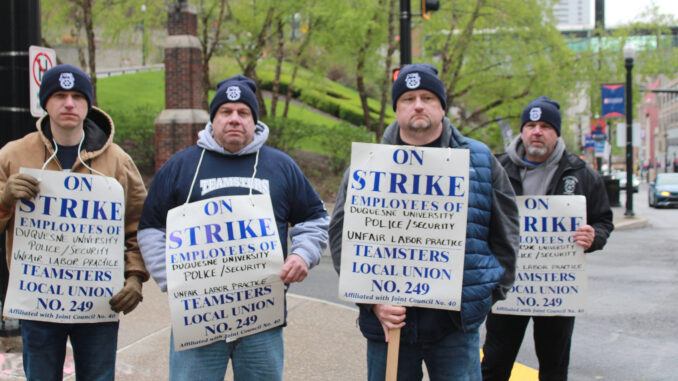
Emily Ambery | Staff Writer
April 20, 2023
Duquesne University and University Police came to a tentative agreement on Wednesday after a two-day strike for a new contract.
The strike ended when both the police and Duquesne expressed satisfaction with the terms discussed after eight hours of meetings on Tuesday.
Sgt. Dan Baker appreciates that the university recognized safety “and making it a top priority.”
Negotiations began nine months prior, in August when DUPD’s contract expired. The union’s motivations to strike were healthcare, wages and pension.
The five administrative DUPD officers, including Chief of Police Eric Holmes, continued to work through the strike.
On Wednesday, Sgt. Frank Cortazzo said that the full complement of officers had returned, and they looked forward to continuing their duty.
“We had a lot of support,” Cortazzo said. “But our biggest fans, the students, faculty and staff really won the day.”
Students on a Duquesne social media platform showed their support for their officers with an attempt to organize a rally on campus during the strike.
“Both groups worked hard, and we put in a long day,” Cortazzo said. “Both sides made concessions.”
In a statement, the university said they appreciated the good faith efforts of all involved
Unsatisfied with negotiations prior to Wednesday’s decision, the police and Teamsters Local 249, the union representing DUPD, announced their intention to strike on Sunday, April 16 after a two-hour meeting. Union members took to the picket line at 7 a.m. the next day.
Union officials expressed frustration with Sunday’s meeting.
Cortazzo and Teamster Local 249 Vice President Keith Frank both said time at the table with Duquesne was only about five minutes.
“We were prepared to meet all night,” Cortazzo said. “Then we sat for two hours and met with them for about two minutes.”
Frank said the university continued to offer the same deal, noting that limited pay increases over the years have stifled progress.
“They continue to throw the same offer across the table; we want to be paid for the work that we do” Frank said on Monday.
Baker said he believed Duquesne’s offer needed to be competitive with Pitt, CMU and Carlow.
In an email sent to students on Sunday evening, Duquesne said their offer “included the highest guaranteed wage increases since the 2001-2006 contract.”
The university maintained the compensation offered was among the most generous in higher education in the region.
Frank said on Monday that the 3% raise the university offered was a net-zero gain given the cuts the offer made in healthcare and pension.
“Teamsters can do math,” Tammy Sabo, treasurer and secretary of Teamsters Local 249, added on Monday.
While on strike, the officers emphasized their reluctance to not patrol campus.
“We do not want to be out here,” Baker said on Monday while striking on Forbes. “We want to get back to work, and we want to keep you guys safe.”
Cars passed by honking in support as officers stood on Stevenson Street and Forbes Avenue with signs and megaphones.
“This morning I was woken up by them striking on the mic,” sophomore Matt Blank said. “I hope something can be resolved to keep safety a priority on campus.”The day the strike began,
Duquesne locked all Living Learning Centers. Students needed to swipe into both the building and the front desk.
“Following a security review,” a statement from the Office of Resident Life said, “the university has made all Living Learning Centers accessible by card swipe only.”
Concerns for safety were at the forefront of discussions during the strike.
“I saw they made the buildings swipe access, and I didn’t really think that much about it,” said physician assistant student Evelyn Foster said on Monday.
This is not the first time Duquesne has combated unionization. Adjunct faculty attempted to unionize in 2012, and Duquesne sued after the National Labor Relations Union rejected the university’s request to disallow the union.
In 2022, a federal appeals court decided that on the basis of Duquesne’s religious affiliation, it was exempt from the NLRB’s rules.
